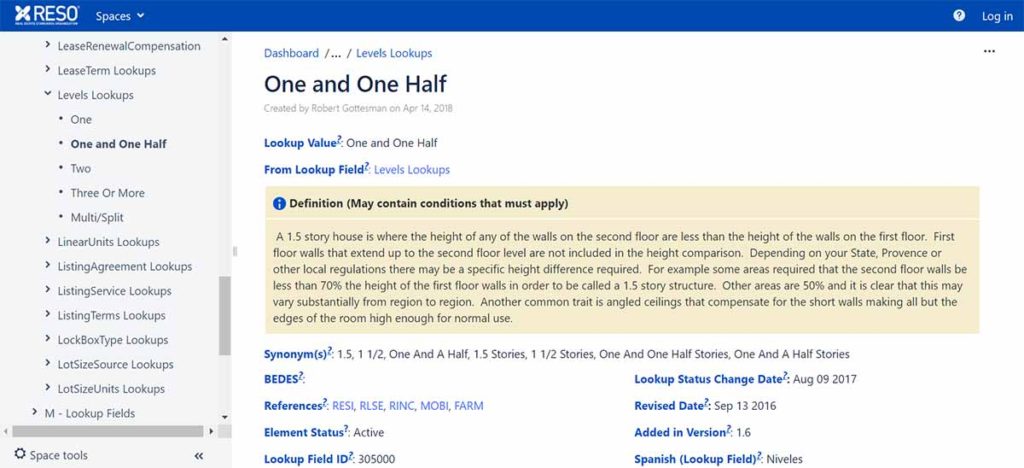Ultimate Real Estate Acronym Dictionary with Definitions
Whether it’s working with investors or explaining an MLS printout to a buyer, knowing your real estate acronyms can save you some embarrassment.
I’ve made a separate dictionary of real estate abbreviations for :
Realtor Acronyms
ADU – Accessory Dwelling Unit. ADUs are a second, permitted housing unit on a SFH lot. It could be a converted garage, a basement unit, or even a detached second home. (LEARN MORE)
API – Application Program Interface. APIs are software tools that allow two different software programs to easily communicate. Direct integrations between software products are often done through APIs, as well as indirect integrations through third-party services like Zapier. An example real estate API is the RESO Web API, a standardized system for software developers to pull authorized information from the MLS in real-time. (LEARN MORE)
CMA – Comparative Market Analysis. A CMA compares comparable home sales to a subject home in order to determine a fair market value (FMV). Creating a CMA for both buyers and sellers is a fundamental due diligence agents owe to their clients when buying or selling. Agents can do this manually, in the MLS, or there are several popular CMA software options. (LEARN MORE)
CMS – Content Management System. “CMS” is more or less a fancy name for your website builder. WordPress is an example CMS and the most widely used CMS in the world. Other CMS examples include Squarespace, Wix, or Drupal. Many real estate website builders build their sites on WordPress. A CMS allows the user to modify a website without hard-coding HTML and CSS, and all real estate website providers have one. (LEARN MORE)
CSS – Cascading Style Sheets. Website developers often want to change the style of an entire website without changing the content. You don’t want to have to go through hundreds or thousands of pages’ HTML to make a sidebar a little thinner. CSS governs the styles of the HTML and can be changed without changing the HTML. WordPress themes are examples of (mostly) CSS code that takes the same content on your website but in different styles. (LEARN MORE) (CSS also may refer to Centralized Showing Services, which is now merged into ShowingTime)
CRM – Customer Relationship Management. An agent’s database is their business, and the CRM is the software that manages their customer information. It might be the same software as their website and transaction management, or might not. Salesforce is an example CRM, the largest in the world. Real estate has a lengthy list of real-estate-specific CRMs as well.(LEARN MORE)
CTA – Call-to-Action. The call-to-action is a marketing term for component of your marketing materials that is intended to prompt the customer to take action. For agents, that is usually submitting a home inquiry or contacting an agent. (LEARN MORE)
CTR – Click-through-Rate. For Google/Bing search results, the CTR is how often a user clicks the link and goes to your website. The CTR is much higher near the top of the search results, and drops precipitously after spot #3 (and especially once on the second page). Optimizing your content titles and advertising to boost your CTR even a fraction of a % can be worth a lot of money if you are in SEO or SEM. (LEARN MORE)
HDR – High Dynamic Range. a technology that improves the range of color and contrast in a digital image. It may be used for both photos and videos, though the implementations are different. (LEARN MORE)
HTML – Hypertext Markup Language. HTML is the basic language of websites. HTML controls your website’s content while CSS controls its stylization. HTML is easy to learn a few things if necessary for your site, but most likely you will not need to. Most websites have a CMS that often includes a drag-and-drop WYSIWYG editor (what-you-see-is-what-you-get). (LEARN MORE)
IDX – Internet Data Exchange. IDX is the set of MLS standards and tools to extract listing data from MLSs to display on websites. These are usually the tools used to showcase listing and search information on agents’ business websites. If you are an agent with a website, you’ll want it to be an IDX website. (LEARN MORE)
ISA – Inside (Internal) Sales Agent. ISAs are team members who generally handle inbound lead flow and turn leads into appointments. For larger teams, this is often a full-time salaried position. Agents and brokerages also sometimes make use of virtual assistant ISA companies or even AI “ISAs” follow up systems. (LEARN MORE)
MLS – Multiple Listing Service. The MLS is an organization that controls a database of listings. Agents advertise their homes to other agents within the MLS. Many MLSs are owned by Realtor associations, though not all. Some areas don’t have MLSs, like New York City, but most do. The MLS may also refer more specifically to the software that the MLS uses for its listing and property database, the most used technology tool by Realtors. (LEARN MORE)
NAR – National Association of Realtors. NAR is the professional trade organization for residential real estate salespersons in the US. Members are referred to as “Realtors”. NAR lobbies Congress, enforces industry standards, and often owns local MLS services. Related acronyms include the myriad state associations (CAR, TAR, etc), local associations within those states (FHAAR, ABOR, HAR, etc), and their MLS organizations (CTXMLS, NTREIS, ACTRIS, etc). (LEARN MORE)
PPC – Pay-Per-Click. PPC refers to a specific paid advertising in which you are billed whenever a customer clicks through to your site. The most two companies that dominate PPC spending are Google Ads and Facebook Ads. There are other spending strategies as well, like paying for impressions (PPM), or pay-for-action (PPA, e.g. only paying for customers who actually sign up). (LEARN MORE)
RESO – Real Estate Standards Organization. RESO is the main data standards organization for residential real estate. They certify participating MLSs on data standards which allow for technology to connect with data across markets. They also have the RESO Web API which is replacing RETS, allowing tech vendors to query MLSs directly instead of having a middle man. (LEARN MORE)
RETS – Real Estate Transaction Standard. RETS is the data standard language via which vendors pull information from MLSs. It was launched in 1999 by NAR, but is being generally replaced by RESO Web API. It’s not uncommon to hear people still refer to a “RETS” feed, even if it is the API, just because “RETS” feed has been the lingo for so long for connecting to the MLS. (LEARN MORE)
RON – Remote Online Notarization. Online notarization is exactly what it sounds like. Unlike e-signature, the notary is present via a video messaging app like Zoom or Skype so that it has the most critical elements of a traditional notary. This technology has been slow to be adopted and allowed by government authorities, but it’s likely that the social distancing from the COVID pandemic in 2020 will help drive more online notarization adoption by authorities. (LEARN MORE)
SEO – Search Engine Optimization. SEO is the art (or is it a science?) of optimizing your website to be found organically on search engines like Google. Google does not publicize their algorithm for how they ranks pages, and there is an entire industry essentially designed to figure it out. Real estate SEO has its own industry-specific nuances. (LEARN MORE)
SERP – Search Engine Results Page. Most search engines show a page of 10 results when you search a keyword. This is a SERP. Getting ranked high on SERPs or even featured snippets is the primary goal for SEO expert. (LEARN MORE)
TMS – Transaction Management Software. Your transaction software may be part of your CRM or platform, or it may be a standalone software specifically for managing the real estate contract-to-closing. A related acronym is TM, referring to the transaction manager in an office. (LEARN MORE)
UX – User Experience. The user experience is most commonly associated with software, describing how the software or website tools meet and surpass user expectations. It has taken a broader definition, differentiating it from UI, by also applying to the analogy real world. Closing gifts and smooth transactions are a form of user experience. (LEARN MORE)
UI – User Interface. UI and UX are sometimes used synonymously. But UI is a bit more specific to the experience with a software or website interface. Navigable menus, simple layouts, not buggy … these are elements of good UI. (LEARN MORE)
VA – Virtual Assistant. There are quite a few real estate VA companies, many of which use employees in the Philippines to help with transactions and admin work. A brokerage firm might hire VAs through a third-party VA service or hire them internally. The difference between a VA and a remote worker is whether they are employees or 1099 workers. (LEARN MORE)
VOW – Virtual Office Website. VOW is similar to IDX, except VOW often has fewer restrictions and has more data, like sales prices. VOW rules vary by MLS, but often require the customer to log in before using. VOW was somewhat controversial and IDX became the most common standard for displaying MLS data, but VOW is the more powerful of the two. (LEARN MORE)
Real Estate Investor Acronyms
ARV – After Repair Value. Alternatively called FMV, or Fair Market Value, the ARV is the resale value an investor hopes to achieve selling a property after completing the necessary repairs. (LEARN MORE)
FSBO – For Sale By Owner. Often targeted by real estate agents and investors alike, a FSBO (pronounced FIZZ-bow) is a homeowner who is attempting to sell a home without a licensed agent representing them. A significantly fraction of FSBO homeowners fail to sell and ultimately sell with an agent. (LEARN MORE)
FRBO – For Rent By Owner. You may not be in the rental business, but owners trying to rent their homes themselves may be interested instead in selling, whether that be with an agent or directly to an investor. (LEARN MORE)
GRM – Gross Rent Multiplier. The GRM is a shorthand for considering investment opportunities. It is not as popular as cap rates or NOI because it doesn’t account for expenses, but can still be useful for quickly comparing investment opportunities. It is calculated as the (Property Price / Gross Rental Income). (LEARN MORE)
IRR – Internal Rate of Return. IRR calculates the lifetime annualized return on an investment. It is one of the most comprehensive ways to measure an investment’s ROI, but also doesn’t lend itself to quick paper-napkin math. (LEARN NOW)
MFH / MFR – Multi-family Home/Residential. Duplexes, Fourplexes, and apartment buildings. 2-4 unit buildings are not considered “commercial” and can be financed with conforming Fannie Mae loans. Buildings with more units are generally subject to commercial financing. (LEARN MORE)
NOI – Net Operating Income. NOI is a measure of your return focused on how much money a property is earning. It is net income: (Gross Income – Operating Expenses). (LEARN MORE)
REIT – Real Estate Investment Trust. REITs (pronounced REET) are institutional real estate investors that are securitized and sold on market exchanges just as would be normal stocks. Most REITs are commercial and apartment buildings, though some single family REIT examples include Invitation Homes or American Homes 4 Rent. (LEARN MORE)
ROI – Return on Investment. There are several ways to calculate ROI, included the aforementioned cap rate, cash-on-cash return, NOI, and IRR. (LEARN MORE)
Real Estate MLS and Property Defintions
The Real Estate Standards Organization maintains the most used data standard in North America for residential real estate. RESO certified MLSs map their data to RESO’s real estate dictionary. Consequently, these fields mean generally the same thing in one MLS as it does another.
Their database includes terms and definitions for the most common MLS fields. These can be worthwhile to review so that you are correctly describing your own listings in the MLS.

For example, here is the data dictionary’s definition of a 1.5 story home:
A 1.5 story house is where the height of any of the walls on the second floor are less than the height of the walls on the first floor. First floor walls that extend up to the second floor level are not included in the height comparison. Depending on your State, Provence or other local regulations there may be a specific height difference required. For example some areas required that the second floor walls be less than 70% the height of the first floor walls in order to be called a 1.5 story structure. Other areas are 50% and it is clear that this may vary substantially from region to region. Another common trait is angled ceilings that compensate for the short walls making all but the edges of the room high enough for normal use.
RESO
Realtor Designation and Accreditation Acronyms
A frequent query regards the string of abbreviations following the Realtor’s name in email signatures. Below is a list of of those designations and certifications, what they mean, and where you can learn more.
Some of these are general, like the GRI (which I highly recommend to agents looking for their first designation). Others are specialized and might be especially useful for agents who have niche real estate business models, like the SFR or GREEN certifications.
- ABR – Accredited Buyer’s Representative
- AHWD – At Home With Diversity
- ALC – Accredited Land Consultant
- CCIM – Certified Commercial Investment Member
- CIPS – Certified International Property Specialist
- CPM – Certified Property Manager
- CRB- Certified Real Estate Brokerage Manager
- C-RETS – Certified Real Estate Team Specialist
- CRS – Certified Residential Specialist
- CRE – Counselor of Real Estate
- Digital Marketing: Social Media
- e-PRO
- GAA – General Accredited Appraiser
- GREEN – NAR’s Green Designation
- GRI – Graduate REALTOR Institute
- MRP – Military Relocation Professional
- PMN – Performance Management Network
- PSA – Pricing Strategy Advisor
- RAA – Residential Accredited Appraiser
- RCE – REALTOR Association Certified Executive
- RENE – Real Estate Negotiation Expert
- Residential Listing
- RSPS – Resort and Second-Home Property Specialist
- SFR – Short Sales and Foreclosure Resource
- SRS – Seller Representative Specialist
- SIOR – Society of Industrial and Office REALTORS
- Smart Home
- SRES – Seniors Real Estate Specialist
Conclusion
Don’t get caught flat footed not knowing your real estate terms!


